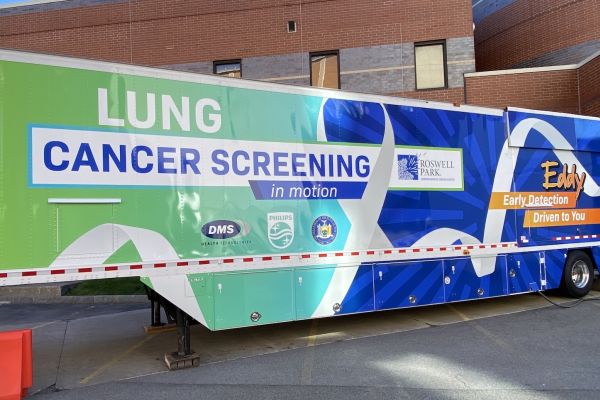How a critical discovery years ago ushered in a wave of new drugs
Breakthroughs in cancer research are always something to celebrate. This year marks the 20th anniversary of a particular breakthrough in lung cancer treatment — the discovery of the EGFR gene mutation — that revolutionized how oncologists personalized treatment to each lung cancer patient. That pivotal moment also led to the development of at least 10 classes of targeted therapy drugs and counting, as new drugs are being created to target new subtypes of lung cancer.
“The discovery of the EGFR mutation was the start of precision medicine for lung cancer treatment,” says Grace Dy, MD, Director of Translational Research for Thoracic Medicine at Roswell Park Comprehensive Cancer Center. “It meant that we could now choose a specific drug for a patient based on their cancer’s unique molecular profile which increases the likelihood of treatment response compared to conventional chemotherapy.”
Precision medicine matches treatment to a tumor’s DNA and protein profile
Precision medicine requires two important scientific discoveries to happen: 1) The discovery of a unique characteristic or genetic error that is only present in the cancer cells and not healthy cells; and 2) the creation of a drug that can target that unique characteristic and thereby affect only the cancer cells.
In lung cancer, the drugs to target EGFR actually came first. EGFR is an acronym for epidermal growth factor receptor, a protein on the surface of cells that helps cells to grow. When those first drugs gefitinib and erlotinib were initially available, they were being used for all patients with non-small cell lung cancer. “It was hypothesized initially that since lung cancers typically have a lot of the EGFR protein, the EGFR-targeting drugs would be effective for a large group of lung cancer patients,” explains Dr. Dy.
“The problem was that the drugs didn’t work well for the majority of patients with non-small cell lung cancer,” says Dr. Dy. “But there was a small proportion of patients in whom it worked very well, a group of patients we call exceptional responders.”
When scientists went back to look at the tumors of these exceptional responders and could use new advances in DNA sequencing to test and analyze the tumors, they discovered the tumor cells had an error or mutation in the gene that provided instructions for making the EGFR protein. They then realized this mutation might be what is causing the cells to grow and multiply too much and too fast, leading to cancer.
Researchers were able to prove that testing for the EGFR gene mutation could predict response to therapy, and that patients with non-small cell lung cancer and the EGFR mutation had improved survival with the drug gefitinib or erlotinib over chemotherapy. To date, scientists have discovered more than 70 types of EGFR mutations.
Today, with advanced comprehensive biomarker testing, Roswell Park analyzes the tumors of every patient with non-small cell cancer to look for abnormal DNA or RNA changes, several of which there is a corresponding class of an FDA-approved drug available — or a new agent in a clinical trial that targets that mutation.
The benefits of a clinical trial
The robust research program at Roswell Park provides our patients with more options to maximize their survival.
Another mutation is more prevalent in WNY
About 10-15% of lung cancers in the United States are found to harbor EGFR mutations, with some regional differences. For example, EGFR mutations are more common among patients with an Asian background compared to other ethnicities. In contrast, mutations in a different gene called KRAS are more prevalent in Western New York — and found in about 25% of lung cancers.
Although the KRAS gene error was discovered in 1982 (before discovery of the EGFR mutation), finding a way to target it proved elusive, and the mutation was called “undruggable” for decades. A breakthrough was finally reached in 2021 when the first drug to target a KRAS mutation, sotorasib, was FDA approved for patients with non-small cell lung cancer and the KRAS G12C mutation. Another drug for the same mutation, adagrasib, soon followed. Patients at Roswell Park had advanced access to both these drugs through clinical trials prior to their FDA approval.
Diana Halter was among the first patients to benefit from adagrasib when she enrolled in the clinical trial at Roswell Park. From the Rochester area, she was shocked to receive a diagnosis of stage 4 lung cancer. “I did smoke, but had quit 12 years prior, and I had been healthy up to that point,” she says. “I was told my cancer was untreatable, uncurable and that I had three to six months to live.” Chemotherapy and immunotherapy temporarily halted the cancer, but after a year and a half, that combination failed. So, her oncologist in Rochester contacted Roswell Park to learn if there was a clinical trial for her.
Diana’s tumor was found to have the KRAS mutation known as G12C, the specific mutation that adagrasib was designed to target. Four years after beginning the drug on the clinical trial, Diana says she’s the “healthiest sick person you’ll ever meet! I have a beautiful quality of life. All my tumors have shrunk, and a metastatic tumor on my spine remains stable. I do everything. I travel and I was there for the births of my three grandchildren.” One day she was singing in the car and realized she hadn’t been able to do that for some time. “I have enough breath to sing now,” she says.
Relentless research provides new options
Today, Roswell Park has multiple clinical trials that are studying new agents for lung cancer that are designed to target specific mutations. “While progress has been made, resistance to these first-generation drugs inevitably develop and thus newer agents continue to be developed,” says Dr. Dy. Some highlights include:
- Next-generation KRAS G12C inhibitor to overcome resistance to sotorasib and adagrasib
- A drug to target another the G12D type of KRAS mutations
- A drug that may target any type of KRAS mutation
- Antibody-drug conjugates, a type of drug that uses a targeted therapy drug to carry a cancer-killing drug such as chemotherapy to the cancer cells.
- New agents against mutations for which there are still no available drugs, such as mutations of the MTAP gene
“With improved testing platforms to help us identify biomarkers to guide treatment decisions, we have seen continued progress leading to better survival for lung cancer patients,” says Dr. Dy.
Editor’s Note: Cancer patient outcomes and experiences may vary, even for those with the same type of cancer. An individual patient’s story should not be used as a prediction of how another patient will respond to treatment. Roswell Park is transparent about the survival rates of our patients as compared to national standards, and provides this information, when available, within the cancer type sections of this website.




